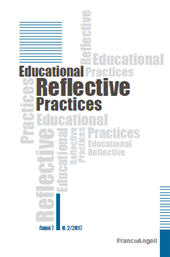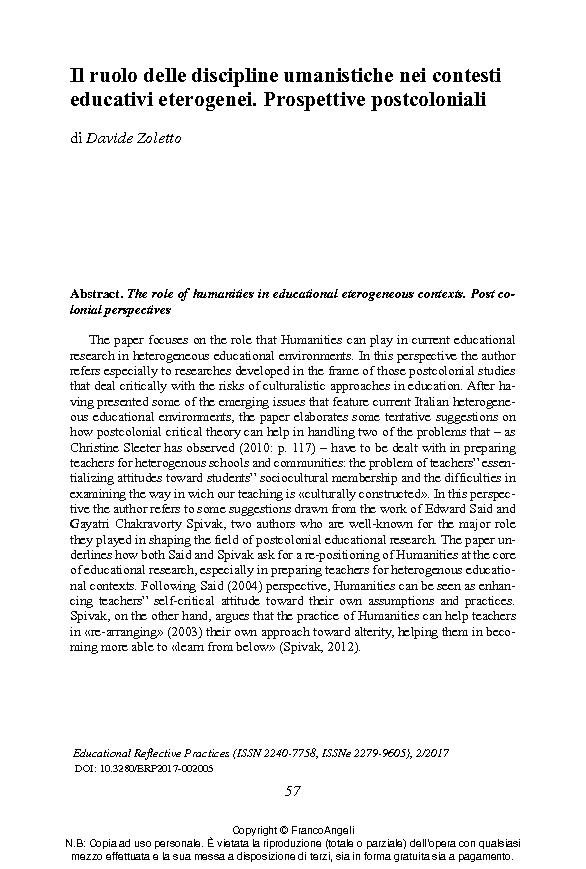2017 - Franco Angeli
Articolo
Versione Digitale
Download | Copia/incolla | Stampa
Il ruolo delle discipline umanistiche nei contesti educativi eterogenei : prospettive postcoloniali
57-70 p.
- The paper focuses on the role that Humanities can play in current educational research in heterogeneous educational environments. In this perspective the author refers especially to researches developed in the frame of those postcolonial studies that deal critically with the risks of culturalistic approaches in education. After having presented some of the emerging issues that feature current Italian heterogeneous educational environments, the paper elaborates some tentative suggestions on how postcolonial critical theory can help in handling two of the problems that - as Christine Sleeter has observed (2010: p. 117) - have to be dealt with in preparing teachers for heterogenous schools and communities: the problem of teachers" essentializing attitudes toward students" sociocultural membership and the difficulties in examining the way in wich our teaching is «culturally constructed».
- In this perspective the author refers to some suggestions drawn from the work of Edward Said and Gayatri Chakravorty Spivak, two authors who are well-known for the major role they played in shaping the field of postcolonial educational research. The paper underlines how both Said and Spivak ask for a repositioning of Humanities at the core of educational research, especially in preparing teachers for heterogenous educational contexts. Following Said (2004) perspective, Humanities can be seen as enhancing teachers" self-critical attitude toward their own assumptions and practices. Spivak, on the other hand, argues that the practice of Humanities can help teachers in «re-arranging» (2003) their own approach toward alterity, helping them in becoming more able to «learn from below» (Spivak, 2012). [Publishers' text].
Fa parte di
Educational reflective practices : 2, 2017-
Informazioni
Codice DOI: 10.3280/ERP2017-002005
ISSN: 2279-9605
-
Nello stesso fascicolo
- Introduzione : rifletter(si) cosmopoliticamente nel mondo : prospettive pedagogiche
- Globalizzazione, educazione e pensiero delle differenze
- Il contributo della pedagogia interculturale
- Cosmopolitismo, bisogno di dialogo e competenze (propriamente) interculturali
- Il ruolo delle discipline umanistiche nei contesti educativi eterogenei : prospettive postcoloniali
- Educazione e leadership nelle scuole oggi : una prospettiva cosmopolitica
- L'educazione al cosmopolitismo nella Comunità di Ricerca Filosofica : imparare ad abitare gli spazi intermedi
- Dialogo filosofico, cosmopolitismo educativo e comunità di ricerca
- Immaginare l'Altro : il museo come dispositivo interculturale
- Recensioni
- Autori



